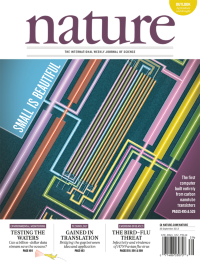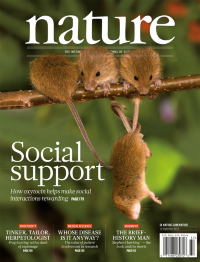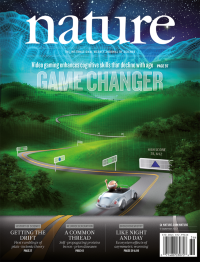Volume 501
-
No. 7467 19 September 2013
Next week, the Intergovernmental Panel on Climate Change (IPCC) delivers its fifth report in its UN-initiated mission to assess the magnitude, timing and potential environmental and socio- economic impact of climate change and realistic response strategies�. In this issue of Nature we publish a series of features and comment pieces looking back on the IPCCs first twenty-five years and forward at its future prospects. The consensus that emerges is that although there is still an important role for the panel in driving climate mitigation, it is time to re-evaluate how it offers expert advice to nations. (Cover: Carl DeTorres)
Insight
-
No. 7466 12 September 2013
Juvenile harvest mice engaged in social play. The neural mechanisms underlying the encoding of social reward have remained unknown, despite the need for reinforcement of adaptive social interactions in order to keep such behaviours persistent throughout evolution. Here, Robert Malenka and colleagues report that, in the mouse nucleus accumbens core, the peptide hormone oxytocin is required both for social reinforcement and a form of presynaptic long-term depression of excitatory transmission onto medium spiny neurons. This social reinforcement signal could be disrupted if oxytocin receptors were specifically deleted from inputs arriving from the dorsal raphe nucleus, the major source of serotonin in the brain, or by blocking serotonergic receptors in the nucleus accumbens. Such coordinated activity between oxytocin and serotonin systems provides a possible mechanism for encoding social reinforcement and offers targets for studying further the neural mechanisms of social dysfunction. Cover: Jean-Louis Klein & Marie-Luce Hubert.
-
No. 7465 5 September 2013
An artists rendition of the NeuroRacer cognitive training video game designed for older adults. Our ability to multitask and our capacity for cognitive control decline linearly as we age. A new study shows that cognitive training can help repair this decline. In older adults aged between 60 and 85 who trained at home by playing NeuroRacer, a custom-designed 3D video game, both multitasking and cognitive control improved, with effects persisting for six months. The benefits of this training extended to untrained cognitive functions such as sustained attention and working memory. These findings suggest that the ageing brain may be more robustly plastic than previously thought, allowing for cognitive enhancement using appropriately designed strategies. Cover illustration: Matt Omernick




